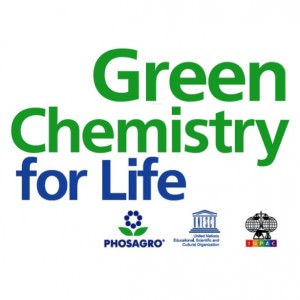 Green chemistry has become a focus for cutting-edge research into sustainable technologies. These technologies may reduce or even eliminate the production and use of hazardous substances in mining and in the design, manufacture and application of chemical products, and may also lead to energy savings, a better environment and improved human health.
Green chemistry has become a focus for cutting-edge research into sustainable technologies. These technologies may reduce or even eliminate the production and use of hazardous substances in mining and in the design, manufacture and application of chemical products, and may also lead to energy savings, a better environment and improved human health.
Research in green chemistry and associated areas in biochemistry, geochemistry, biotechnology, ecology and healthcare give young scientists ample opportunity to demonstrate their inventiveness and provide important input to sustainable development. With this in mind, the Green Chemistry for Life project was launched in 2013 by UNESCO’s International Basic Sciences Programme (IBSP) and PhosAgro, the largest producer of phosphate-based fertilizer in Europe, in close cooperation with the International Union of Pure and Applied Chemistry (IUPAC).
Objectives
PhosAgro/UNESCO/IUPAC research grants in green chemistry programme offers research grants of up to US$30,000 each to scientists aged 39 or under, for innovative research projects that respect the 12 principles of green chemistry, to assist them in implementing their work.
In addition to seeking to harness the talents of young scientists and the fruits of their research for the advancement of green chemistry. The programme sets out to raise awareness among decision- and policy-makers, industrialists and the public at large of the great opportunities green chemistry offers in contributing to address the multitude of pressing societal needs.
See all details unesco.org/en/basic-sciences/green-chemistry
- 12 Principles of Green Chemistry
- Calls for applications
- International Scientific Jury
- Executive agency
- Partners
- Contact
Calls for applications
Green Chemistry research grants for young scientists
Young scientists are invited to submit their applications for PhosAgro/UNESCO/IUPAC research grants in green chemistry. The 8th call for applications is open until 30 June 2023.
Green Chemistry special grants for research projects on phosphogypsum
A special call for applications is also open by PhosAgro, UNESCO and IUPAC in response to specific societal and environmental needs. This special grant will be awarded to a project in green chemistry, by a young scientist, with a PhD degree in chemistry or its allied areas, and have at least 3 (three) publications in recognized scientific journals. The project will focus on innovations in the processing and utilization of phosphogypsum, a mineral technogenic waste material produced in great quantities. The maximum age limit is 39. Young scientists are invited to submit their applications for PhosAgro/UNESCO/IUPAC grants for research projects on phosphogypsum. The 6th call for applications (phosphogypsum projects) is open until 30 June 2023.
(reproduced from UNESCO)
Announcement published in Chem Int April 2023, p.24
